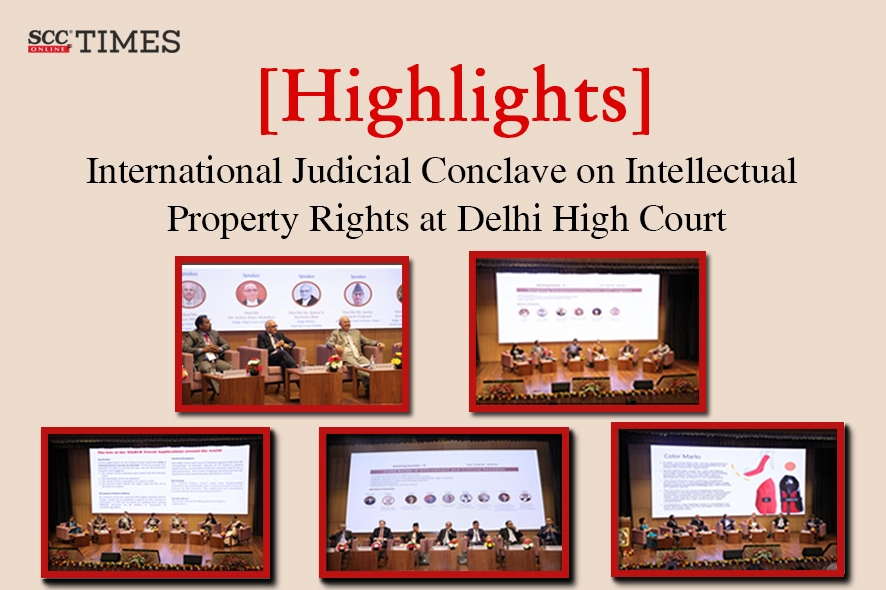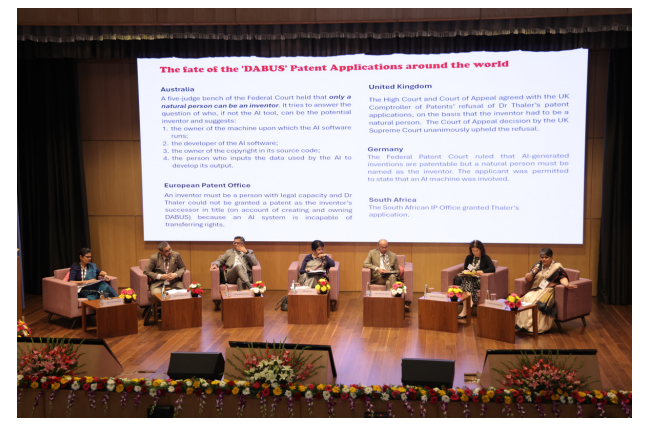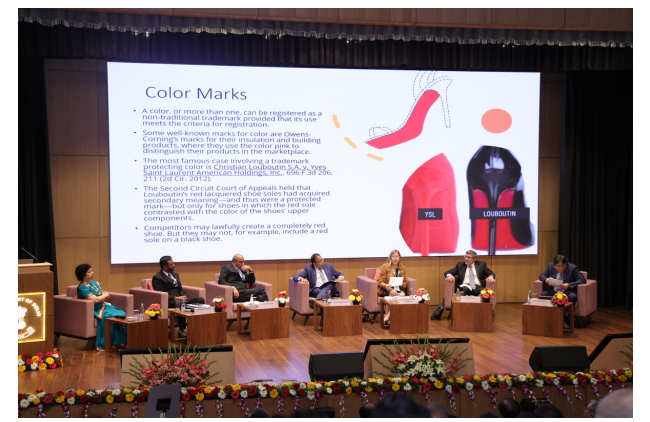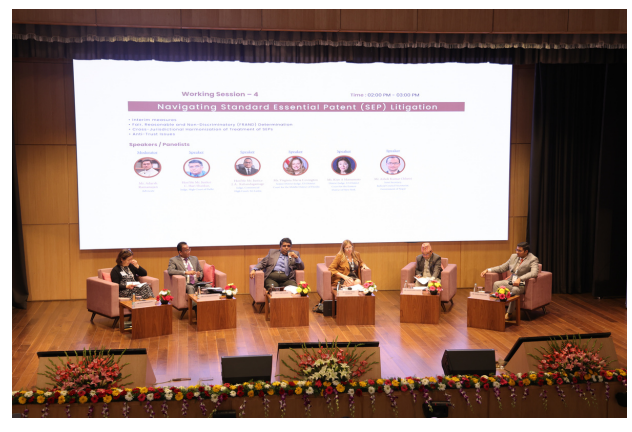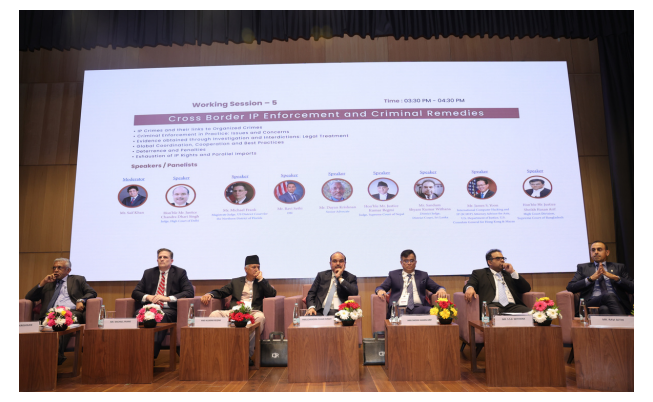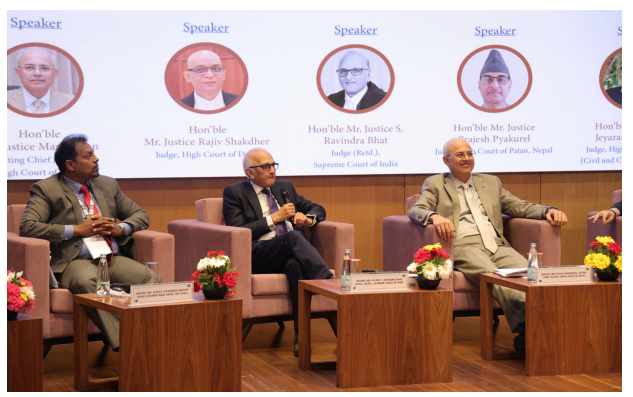The Delhi High Court hosted an International Judicial Conclave on Intellectual Property Rights in collaboration with Delhi Judicial Academy, United States Patents and Trademarks Office and United States Department of Justice on 16-03-2024 and 17-03-2024.
16-03-2024
Protecting and Enforcing IP in New Digital Ecosystems
The Panelists for the session were- Justice Hima Kohli, Judge Supreme Court of India; Justice Yashwant Varma, Judge High Court of Delhi; Justice Muhamed Mustaque, Judge, Kerala High Court; K.M. Kamrul Kadar, Judge, High Court Division of Supreme Court of Bangladesh; Amali Ishanthi Kumar Ranaweera, Judge, Civil Appeal, High Court, Sri Lanka; Kiyo A Matsumoto, District Judge US District Court for the Eastern District of New York
Moderator: Advocate Shwetasree Majumder
It was discussed that Patent law in most jurisdictions has so far not recognised AI as an ‘inventor’ of patents, because inventors are required to be natural human persons under most patent statutes. In some jurisdictions, while AI-assisted inventions are not inherently unpatentable, the focus remains on the human contribution to the invention. A patent request filed in Germany, where the inventor was a natural person who prompted an AI tool to create the invention, was granted on this basis. Across jurisdictions, there is consensus that patent law will have to evolve to account for developments in technology, in particular grapple with issues pertaining to the patentability of AI-assisted inventions and the concept of the ‘inventor’ in these cases.
The human contribution was discussed and it was said that the human contribution to copyright is essential, which is underscored by the fact that the term of copyright is tied to the “lifetime” of the author, which would not apply in cases where AI is the author. The impact of data scraping for training AI models must also be examined in the context of privacy laws and personality rights. The collection and processing of personal data without consent, may violate privacy laws. There have also been cases, including in the Delhi High Court, where individuals’ personality rights have been violated by unauthorized AI-generated content.
New Frontiers of Trademark Law
The Panelists for the session were- Justice K.V. Viswanathan, Judge, Supreme Court of India; Justice Anish Dayal, Judge, Delhi High Court; Ms. Naima Haider, Judge, High Court Division of the Supreme Court of Bangladesh; Ms. Virginia Maria Covington, Senior District Judge, US District Court for the Middle District of Florida; Shanaka Harshan Kekunawela Pathiranga, Additional Magistrate, Chief Magistrate’s Court, Sri Lanka; Amit Sibal, Senior
Moderator: Advocate Pravin Anand
It was discussed that non-traditional trademarks, like sound, touch, or smell marks, warrant protection through legal frameworks that acknowledge their distinctiveness beyond conventional marks. Some examples of non-traditional trademarks that are registered are (1) Shape marks: Toblerone, Ferrero Rocher, Zippo; (2) Touch marks: EPI leather, Louis Vuitton; (3) Structure marks: Ismail building; (4) Sound marks: Yahoo!; and (5) Colour marks: Red sole of Chistian Louboutin shoes.
From the Indian perspective, it was discussed that in India, while there is no statutory impediment to registering such trademarks if they can be graphically represented and distinguish goods or services of one from others, enforcement could present practical challenges. The question as to whether personality or publicity rights should be considered an independent proprietary right or fall under the purview of privacy law is a subject of ongoing debate. The speakers also touched upon the protection of Sri Lankan geographical indications into a notable enhancement with the incorporation of a dedicated Geographical Indication section into the Intellectual Property Code in 2022.
Navigating Standard Essential Patent (SEP) Litigation
Panelists:
C. Hari Shankar, Judge, Delhi High Court; Jagath Ariyakaruna Kahadagamage, Judge, Commercial High Court, Sri Lanka; Virginia Maria Covington, Senior District Judge, US District Court for the Middle District of Florida; Kiyo A Matsumoto, District Judge, US District Court for the Eastern District of New York; Ashok Kumar Chhetri, Joint Secretary, Judicial Council Secretariat, Government of Nepal
Moderator: Advocate Adarsh Ramanujan
It was highlighted that the interim measures in SEP litigation may involve assessment of the traditional tests for interim orders, but also involve other unique and distinct aspects. As opposed to assessing non-SEP infringement- comparing the suit patent claims to the allegedly infringing product; in SEP litigation, there are several other factors. Whether the patent maps on to the standard, whether the patent is essential and whether there is infringement.
For SEP litigations in India, the concepts such pro-tem deposits by the Defendant and the requirements for such deposits to be granted were discussed. Unlike in India, SEP litigation in the US do not have concepts of pro-tem deposits by the Defendant and instead deposits are paid by the Plaintiff in lieu of preliminary injunctions.
17-03-2024
Cross Border IP Enforcement and Criminal Remedies
Panelists:
Justice Chandra Dhari Singh, Judge, Delhi High Court; Justice Kumar Regmi, Judge, Supreme Court of Nepal; Michael Frank, Magistrate Judge US District Court for the Northern District of Florida; Sandum Shyam Kumar Withana, District Judge, District Court, Sri Lanka; Senior Advocate Dayan Krishnan, James S. Yoon, International Computer Hacking and IP (ICHIP) Attorney Advisor for Asia, U.S. Department of Justice, U.S. Consulate General for Hong Kong & Macau
Moderator: Advocate Saif Khan
It was discussed that the emergence of gesture trademarks, exemplified by instances such as Gene Simmons’ iconic rock gesture and Jay Z’s diamond sign, raises questions regarding their distinctiveness and scope. In India, it remains to be seen if celebrities like Shah Rukh Khan with his iconic open arms gesture or Ravindra Jadeja’s celebratory gesture could be subject to trademark protection. In India, while there is no statutory impediment to registering such trademarks if they can be graphically represented and distinguish goods or services of one from others, enforcement could present practical challenges. The question as to whether personality or publicity rights should be considered an independent proprietary right or fall under the purview of privacy law is a subject of ongoing debate. A debatable question as to whether personality or publicity rights should be considered an independent proprietary right or fall under the purview of privacy law was discussed.
As the metaverse continues to evolve, questions arise regarding the enforceability of injunctions and the recovery of damages in the virtual realm. Challenges persist in identifying infringers and ensuring compliance. Moreover, the dynamics of enforcement, including the concept of dynamic injunctions are critical in navigating the complexities of protecting intellectual property rights in the digital age, as evidenced by cases involving misuse of NFTs on fake websites. Ultimately, striking a balance between anonymity and protection is crucial in safeguarding intellectual property rights while fostering innovation and expression in the metaverse. The emergence of a pro-damages culture in Sri Lanka, which has garnered attention, was discussed. It was pointed that recent decisions have brought to the fore and addressed complexities surrounding the interplay between legal strategies, cost implications, and procedural timelines within the Sri Lankan judicial system.
Addressing Digital Piracy and Online Counterfeiting
Panelists:
Justice Manmohan, Acting Chief Justice, Delhi High Court; Justice Rajiv Shakdher, Judge, Delhi High Court; Justice S. Ravindra Bhat, Judge (Retd.) Supreme Court of India; Brajesh Pyakurel, Judge, High Court of Patan, Nepal; Jeyaramam Trotsky, Judge, Colombo High Court, Sri Lanka; Kiyo A Matsumoto, District Judge US District Court for Eastern District of New York
Moderator: Advocate Swathi Sukumar
The development of law pertaining to dynamic injunctions in India, was discussed, it was said that it is an example of the law catching up with the technological developments and evolving novel mechanisms to tackle various forms of online piracy. Panelists discussed the UTV judgment of the Delhi high Court which dealt with hydra-headed/rogue websites and developed parameters to assess and ensure that dynamic injunctions are issued only against infringing websites or content therein.
From International perspective, it was discussed that the Government of Nepal is in the process of implementing a new law which aims to enhance protection of IP rights and it is expected that the new law will also attempt to address digital piracy concerns. Although ‘digital piracy’ is not defined in the Sri Lankan IP statutes, existing statutory provisions provides safeguards and addresses digital piracy. The Sri Lankan enforcement mechanism includes civil and criminal remedies to combat IP infringement.
Trade Secrets and Breach of Confidentiality
Panelists:
Justice Moushumi Bhattacharya, Judge, Calcutta High Court; Koruwage Priyantha Fernando, Judge, Commercial High Court, Sri Lanka; Michael Frank, Magistrate Judge, US District Court for the Northern District of Florida; Prof. (Dr.) Pushpa Kumar Lakshmanan, Law Centre-1, Faculty of Law, University of Delhi; Prof. Yogesh Pai, National Law University (Delhi)
Moderator: Advocate J. Sai Deepak
The panelists discussed that there is a need for a statutory framework for the protection of trade secrets that can build upon the existing common law regime. It was highlighted that the lacuna of the current regime was considered in the light of the Report, and it was acknowledged that the same have been addressed by the Report to some degree. The Report does not categorise trade secrets as IPR and the same garnered mixed views among the panel.
Regarding the International perspective, Sri Lanka and US were discussed. It was highlighted that Sri Lanka protects trade secrets within the unfair competition regime. The law provides for civil and criminal remedies. USA relies on both common law as well as statutory laws (criminal and civil) to protect trade secrets. USA has dedicated laws concerning trade secrets, which deal with economic espionage and breach of trade secrets.
Current Issues & Future Trends in Industrial Designs
Panelists:
Justice Vipin Sanghi, Chief Justice (Retd.), Uttarakhand High Court; Justice Manmohan Singh Judge (Retd.), Delhi High Court; Virginia Maria Covington, Senior District Judge, US District Court for the Middle District of Florida; Habakala Kankanamage Naleen Prasanna Alwis, Chief Magistrate, Chief Magistrate’s Court, Sri Lanka; Advocate Abhimanyu Bhandari
Advocate Moderator: Hemant Singh
It was discussed that specialised IP Statutes prescribe a scheme of overlapping in case of design, copyright, and trade marks. For example, under the Trade Marks Act, ‘shape of goods’ and ‘colour combination’ are included. The idea behind adding ‘shape of goods’ in the trade mark act was to protect such unique features in the design of a product which with use attain goodwill and reputation. A controversy surrounding Section 15, Copyright Act, 1957 was highlighted. It excludes granting copyright protection to any registered design. It further states that if a design is capable of being registered but not registered, then the copyright on such designs ceases once the article has been reproduced more than 50 times. It does not take away the creator’s right to exploit.



